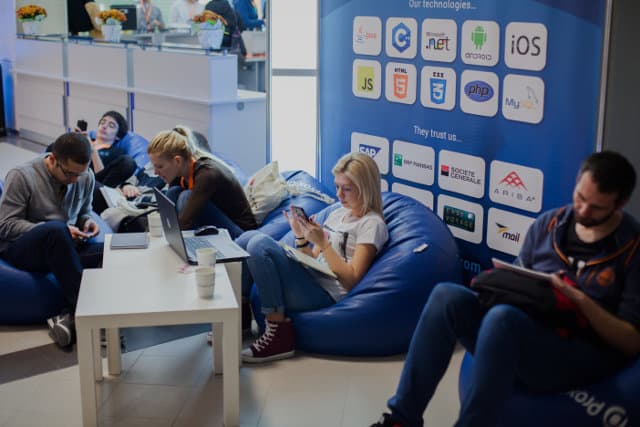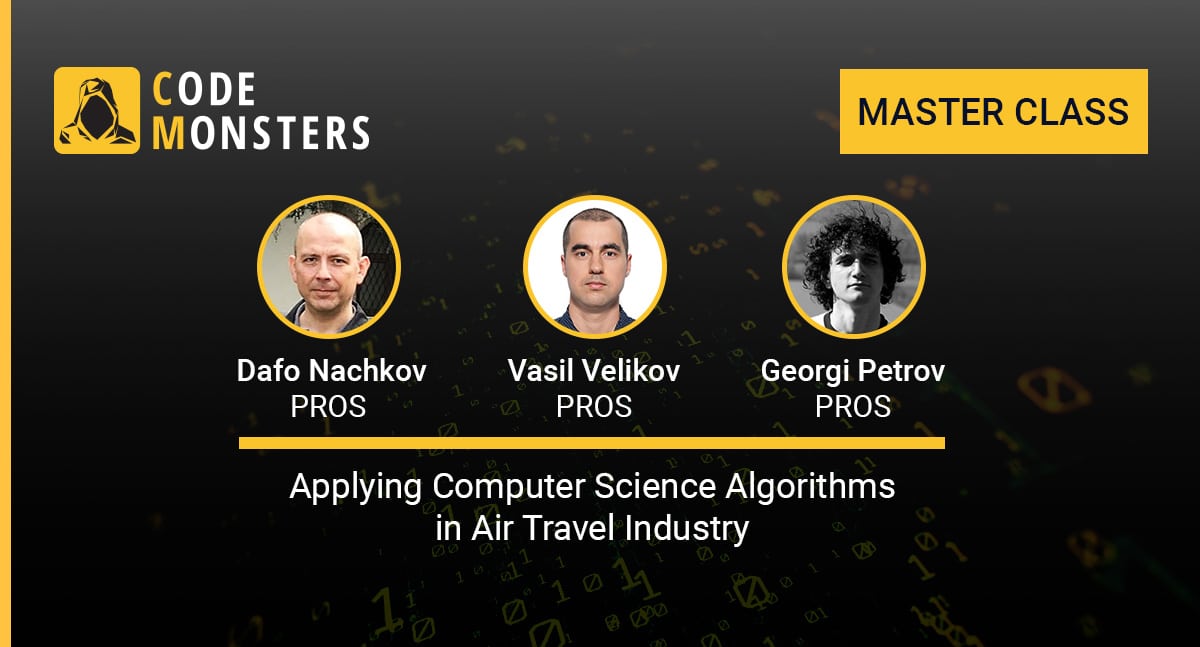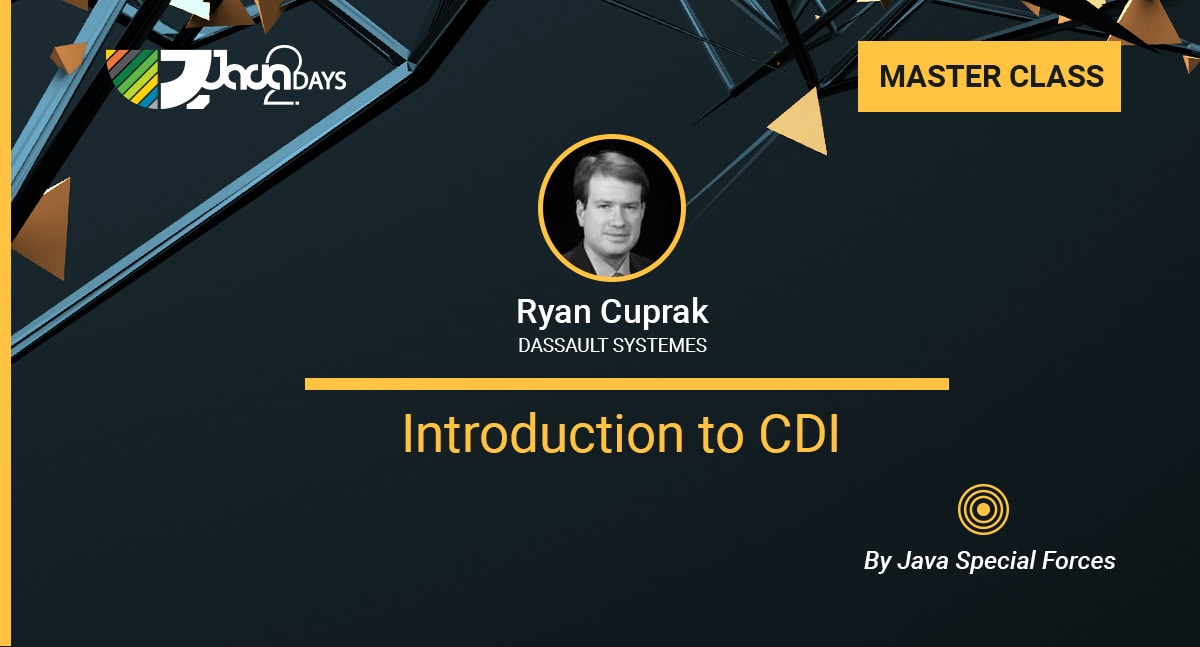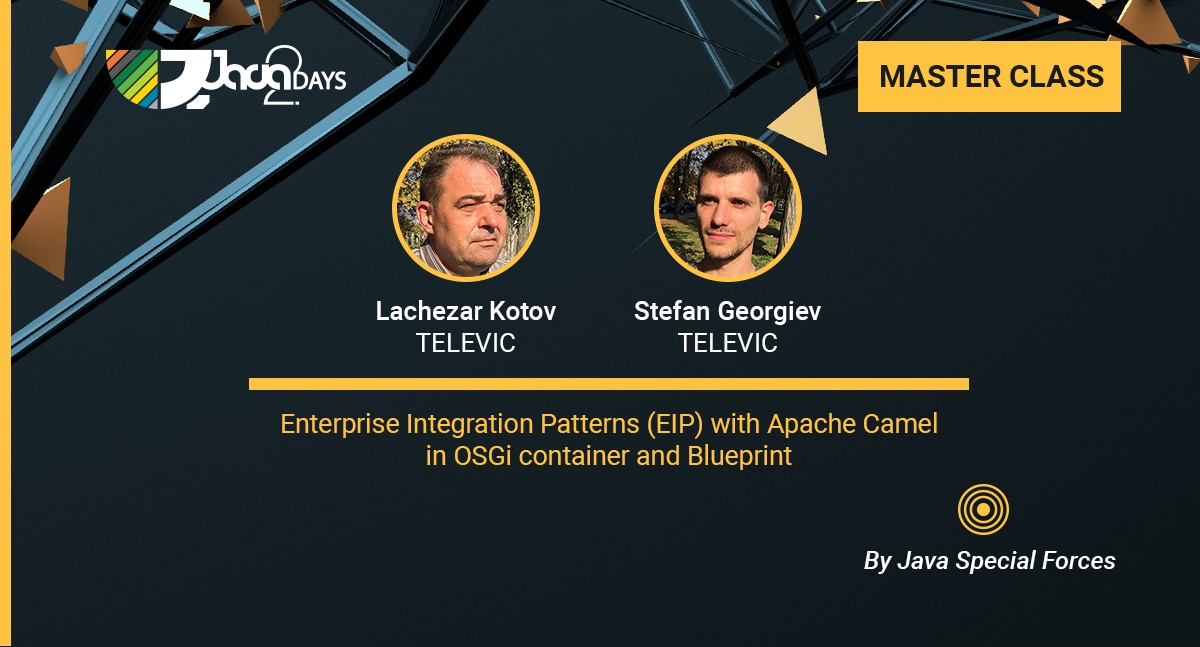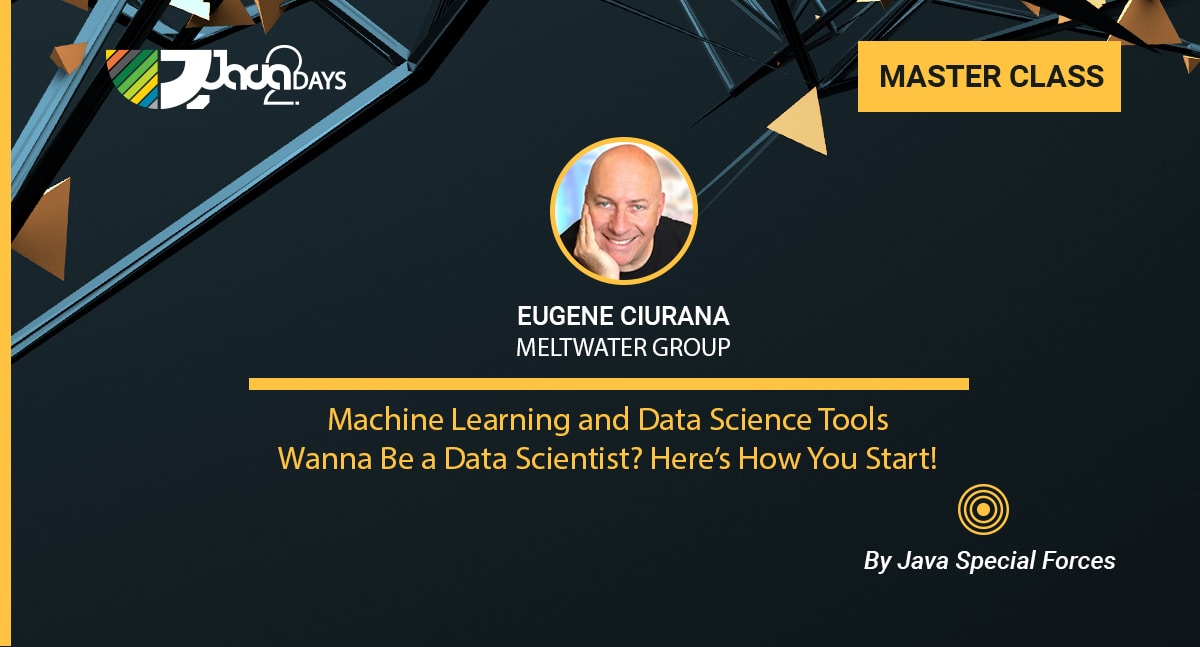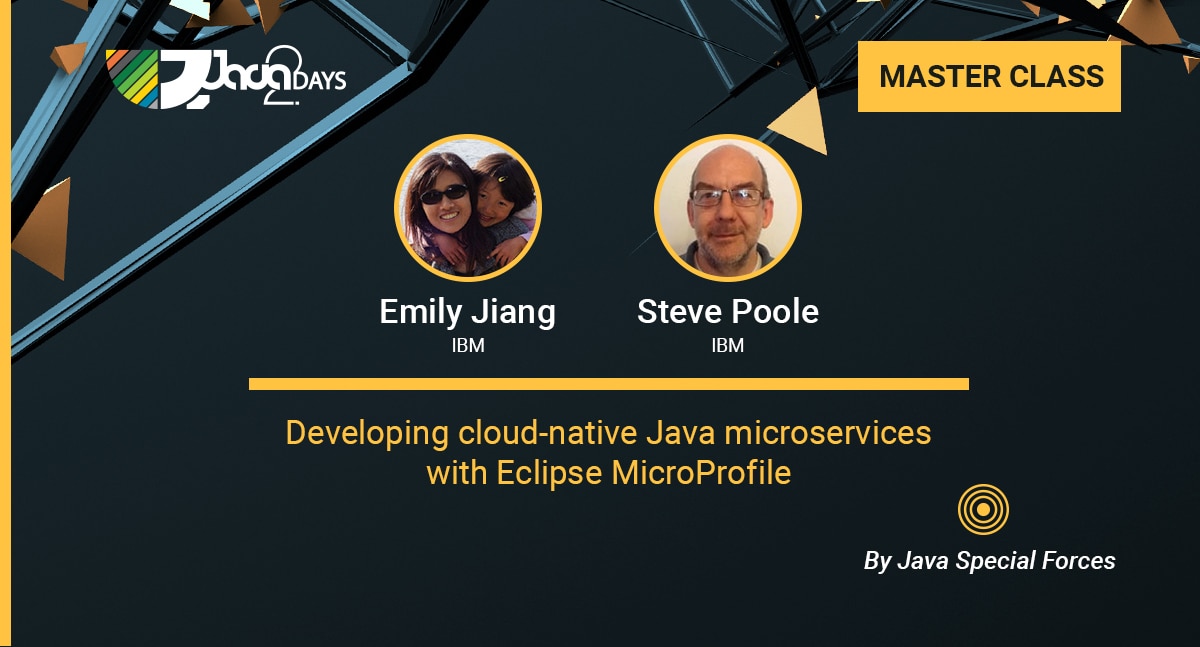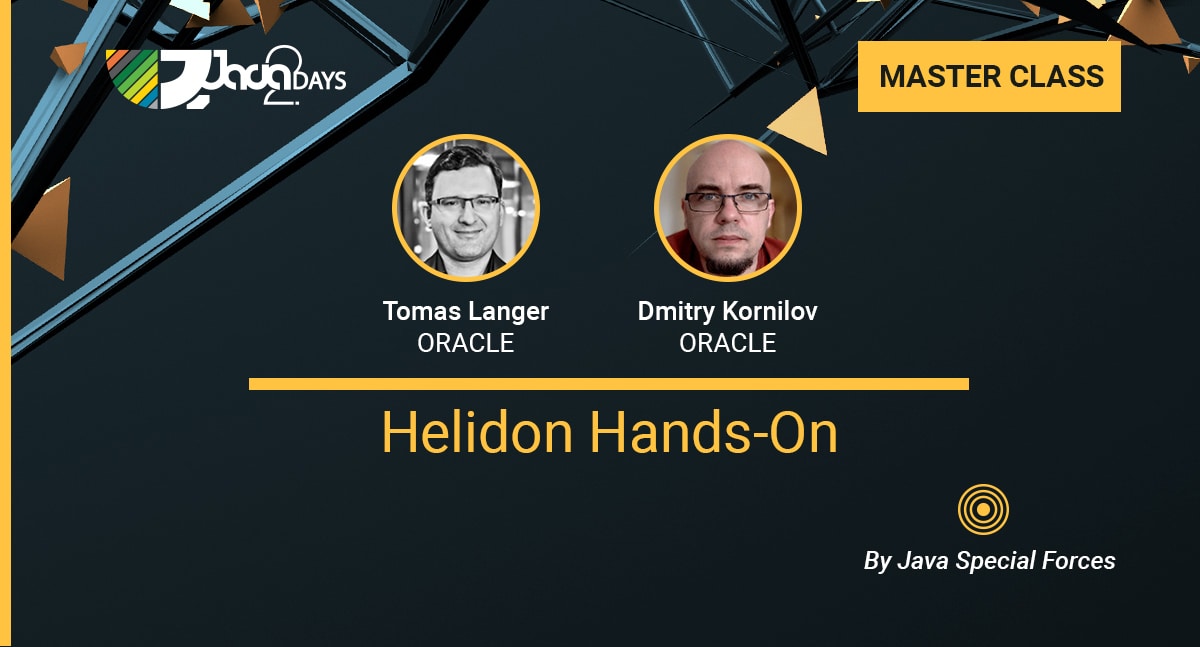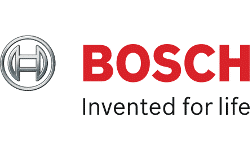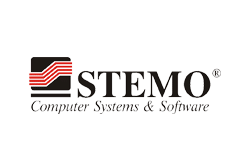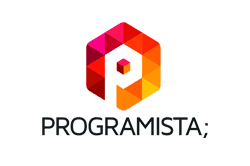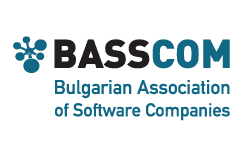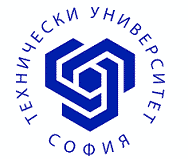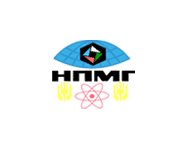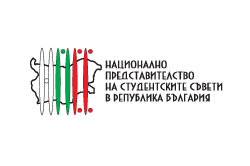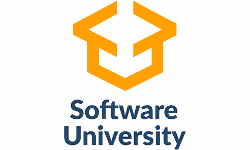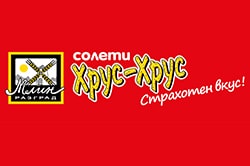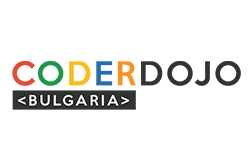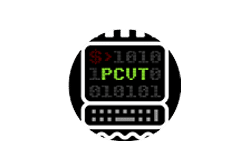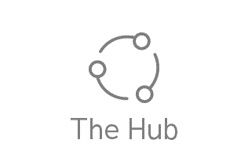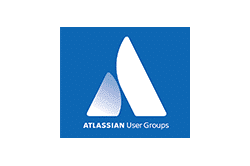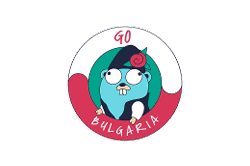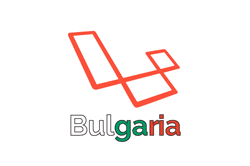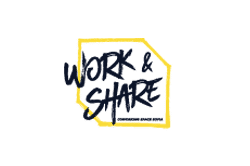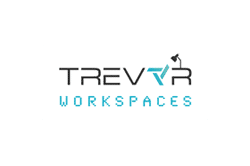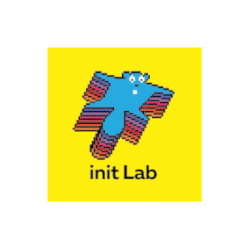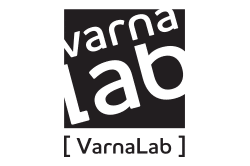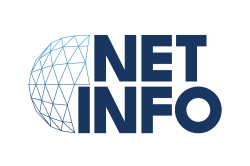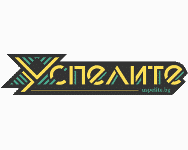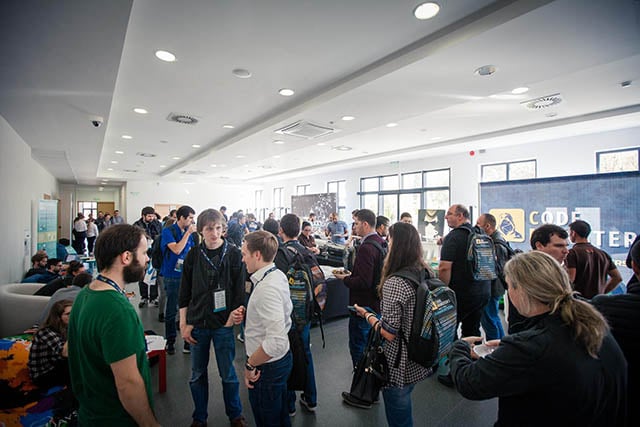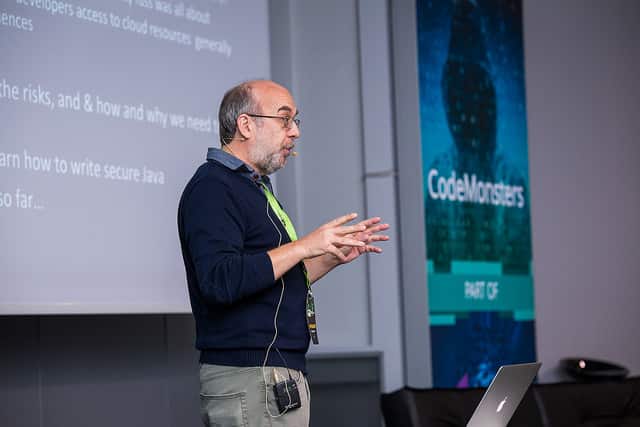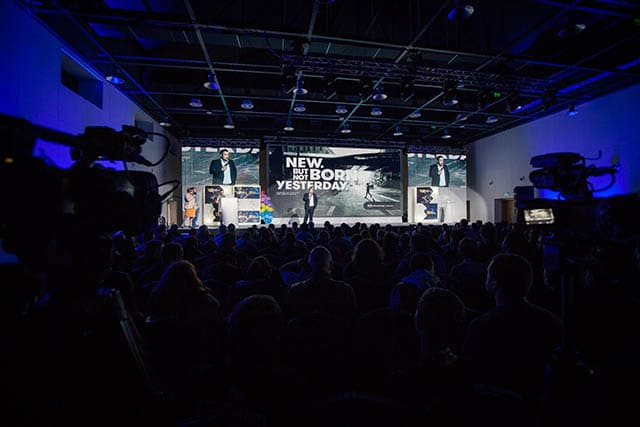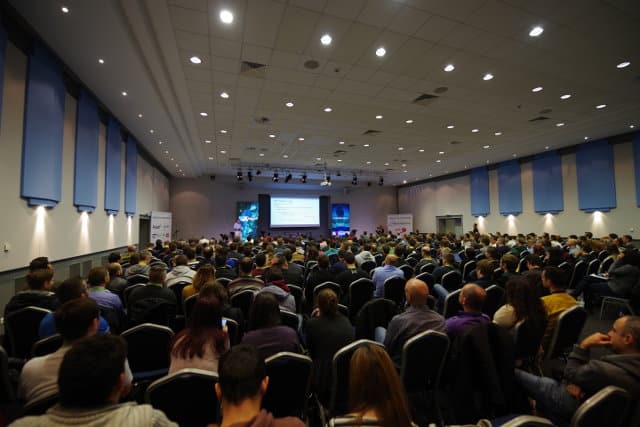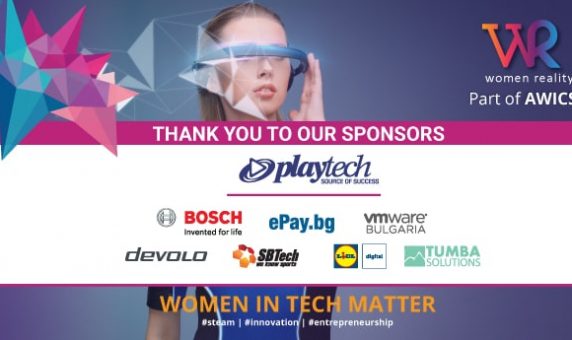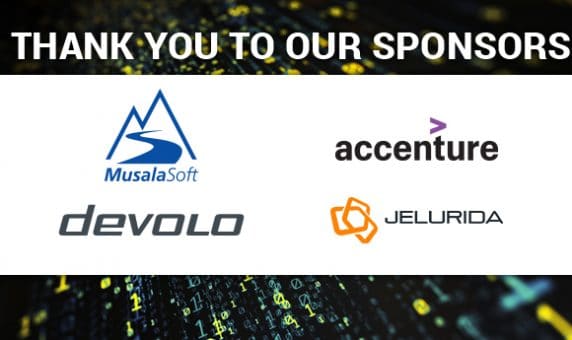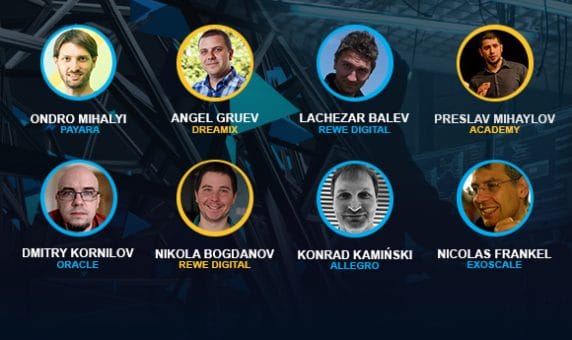-
 27-29 NovemberSofia, BulgariaRegister
27-29 NovemberSofia, BulgariaRegister
Call for papers is will be open till Nov 9th
Featured Speakers
Latest trends. Deep insights. Focused learning. Endless networking. CodeMonsters is the software development conference that offers it all. Come and learn how you can improve your knowledge and combine it with new technologies, to create monster-amazing code.
Check out the conference schedule
CodeMonsters 2018 Speakers

Yordanka Fandakova
Mayor of Sofia
Yordanka Fandakova
Yordanka Fandakova is Mayor of Sofia from 2009. Her previous positions include Member of Parliament, Minister of Education, Youth and Science, Sofia Deputy Mayor for Culture, Education and Sports. Prior to that she gained rich 20-year experience in the area of education as a teacher and as a school principle.
Mrs. Fandakova holds MA in Russian Philology from Sofia University and Pushkin Institute in Moscow. She has additional qualifications in the spheres of management of education, business administration, political management. She speaks Russian and English.
Mrs. Fandakova’s priorities and achievements during her mandates as Mayor of Sofia include fast development of city infrastructure, free and fast internet coverage in public spaces, environment, education, better conditions for doing business in Sofia. During her term in office Sofia became one of the 30 fastest developing cities in the world and the European capital city with the biggest GDP growth in the last 10 years.
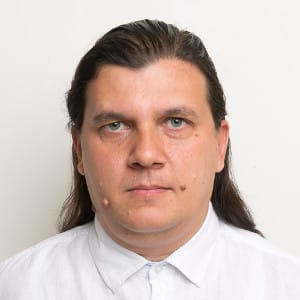
Dr. Pavlin Dobrev
Bosch Software Innovations
Dr. Pavlin Dobrev
Dr. Pavlin Dobrev is a Research and Development Manager at Bosch Software Innovations. The company owned by Bosch is focused on developing software for the Internet of Things (IoT). He is charge for the Quality Management of the Bosch IoT Suite, the entire support of ISO 9001, ISO 20000 and ISO 27001 at Bosch Software Innovations, as well as various research and customer projects.
Dr. Dobrev has more than two decades of experience with IoT including latest Java technologies, as well as in OSGi and embedded systems. He is an active participant in the OSGi Alliance, Java Community Process and other technical standards groups. He is a member of the Eclipse Foundation and participates in the development of the Eclipse IDE as a committer in the Equinox project.
Pavlin Dobrev has a PhD in Computer Systems in the area of Knowledge Management from the Institute for Parallel Processing, Bulgarian Academy of Sciences and holds an MsC in Computer Science from the Faculty of Mathematics and Informatics of Sofia University. He has written many scientific and technical publications and participated as speaker in prestigious international conferences.
An end to the hype: IoT goes mainstream
Have we discovered the Holy Grail of business models for the Internet of Things, the killer app? Does every product need to be connected via a smartphone app? Have, as predicted, billions of devices already been connected? And what will come after the IoT hype is over? In his keynote address, Dr. Pavlin Dobrev traces Bosch’s route to the Internet of Things and its attendant evolution to an IoT company. For Dr. Pavlin Dobrev, the year 2018 marks a turning point: connectivity has finally reached the corporate sector and is now being increasingly commercialized. He believes that the hype surrounding IoT is over – but the excitement is not about to cool. According to a new study, one in two companies is planning to introduce an IoT platform this year. In the past, IoT was the subject of individual task forces and special projects, but now it is set to become an integral part of enterprise infrastructure, product portfolios, corporate strategy, and organization.
Leaning objectives:
- The case example of IoT at Bosch: from traditional manufacturer to IoT company
- Springboards and pitfalls on the path to becoming a successful IoT company
- The role played by IoT platforms, software, and developers in successful IoT companies
- The impact of open source and agile organization on IoT success
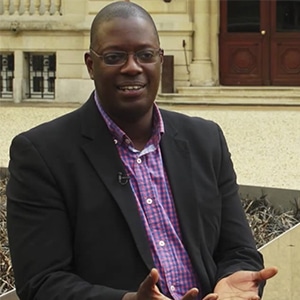
Sudan Jackson
REWE Digital
Sudan Jackson
Sudan Jackson has been working in REWE Digital’s technology division since 2016, where he is responsible for cultural and organisational development. The focus is on actively designing collaborative environments to enable modern, innovative, creative, and customer-focused solutions. And although “Manager” is part of his current title, it only says a little about what he actually does. Sudan is a person who is inspired every day to improve people’s (working) lives. He is a certified coach and trainer, and a welcome speaker at conferences.
Sudan has over 20 years of experience as a personnel developer, project manager, IT consultant and business coach with internationally operating and leading companies where he was responsible for major projects in change management, leadership development, and in the organizational/transformational context.
He has also designed and implemented successful leadership, empowerment and talent management programs. He is very interested (and enjoys it a lot) in discovering new ways to modernize these topics. Working with people and helping others to do great things with his help that are not yet imaginable… This is a task with which he strongly identifies.
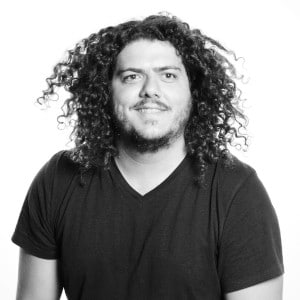
Tito Hamze

Tito Hamze
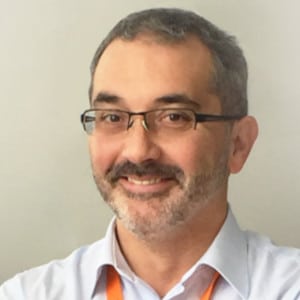
Atanas Kiriakov
Ontotext
Atanas Kiriakov
Atanas Kiryakov (LinkedIn) is the founder and CEO of Ontotext – Semantic Web pioneer and vendor of semantic technology. Atanas is member of the board of the Linked Data Benchmarking Council – standardization body, who’s members include all major graph database vendors.
Atanas is an expert in semantic graph databases, reasoning, knowledge graph design, text mining, semantic tagging, linking and search. Author of signature academic publications with more than 2500 citations. Until 2010 Atanas was product manager of GraphDB (formerly OWLIM) – a leading RDF graph database serving mission critical projects in organizations like BBC, Financial Times, Nikkei, S&P, Springer Nature, John Wiley, Elsevier, UK Parliament, Kadaster.NL, The National Gallery of US and top-5 US Banks.
As CEO of Ontotext, Atanas supervised multiple high profile semantic technology projects across different sectors: media and publishing, market and investment information, cultural heritage and government.
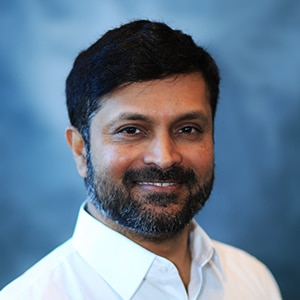
Surain Adyanthaya
PROS
Surain Adyanthaya
Responsible for PROS Travel product strategies, Surain Adyanthaya collaborates with clients to develop and shape airline solutions that address their key industry needs. Surain has held various roles at PROS including head of R&D. With PROS since 1993, Surain works closely with product development in his current leadership role of product innovation and strategy.
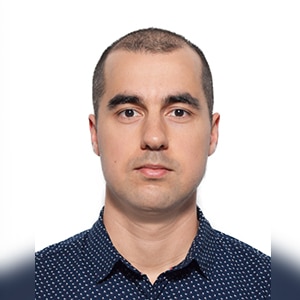
Vasil Velikov
PROS
Vasil Velikov
Vasil Velikov has 10 years of professional software development experience. Having degrees in Computer science and Numerical mathematics, his passion lies in fields that combine mathematics, algorithms and software engineering – high performance scientific computing, numerical simulations, computer graphics. He has been a technical lead at PROS for a little more than one year.
Applying Computer Science Algorithms in Air Travel Industry
We’ll have a look at some Air Travel Industry problems and how we approach them with Computer Science knowledge.
Audience requirements: Attendees are expected to be proficient in C++ and to bring their own development setup (e.g. laptop + IDE). C++ 11, STL (gcc) will be used for the exercise.
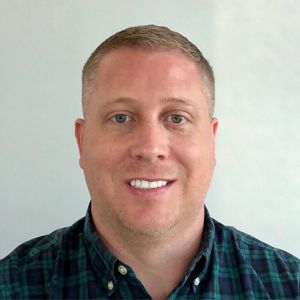
Brent Franklin
PROS
Brent Franklin
I have 18 years of experience in developing software and leading people and projects. Originally from Texas, I currently lead some of the amazing development teams at PROS in Sofia, Bulgaria, focused on building cloud-based solutions for the airline industry. I’m passionate about development best practices and clean, beautiful code. I enjoy working with customers to understand their business challenges and then bringing a technical solution to life. I am currently obsessed with trying to find good Tex-Mex food in Europe to cope with my withdrawals.
The travel search problem – from complex industry standards to pure algorithms and engineering
We will talk about combinatorial and search problems from real-life tasks within our product and we will propose possible computer science solutions with their pros and cons for one or more problems. We will cover up to 3 problems.

Jonathan Johnson

Jonathan Johnson
Jonathan Johnson has been engineering commercial software for some twenty years. Software has the amazing potential to improve and even save lives. Sadly, lousy software can miss this potential. His journey is driven by delivering helpful software to move us forward.
His early work began with laboratory instrument software and managing its data. Jonathan was enticed by the advent of object-oriented design and Windows to develop personal banking software. Banking soon turned to the internet and enterprise applications took off. Java exploded onto the scene and since then he has inhabited that ecosystem. At 454 Life Sciences and Roche Diagnostics Jonathan returned to laboratory software and leveraged Java-based state machines and enterprise services to manage the terabytes of data flowing out of DNA sequencing instruments.
His journey continues with Thermo Fisher Scientific as a hands-on architect continuously delivering a laboratory management platform based on Kubernetes with microservices.
Hands-on Architect
Understanding Kubernetes
So you have some code and it is in a bounded context with a REST API. You are on your way to Microservices. Next you wrap it in a container and now it is an image that others can run. Simple. Now what? No service is an island. Your service needs to log information, needs to scale and load balance between its clones. Your service needs environment and metadata way outside its context. What about where the service will run? Who starts it? What monitors its health? What about antifragility? Updates? Networking? Oh my.
Services live in clusters and clusters live in data centers. Many concepts overlap with the features of cloud management. But don’t get too flustered since, fundamentally, services are managed by clusters. There are several approaches to cluster management such as Docker Swarm, Mesos with Marathon and Kubernetes.
Minikube with Kubernetes is an approachable technique to set up a local cluster that is easy to understand and get started. Whether you have a simple service or a Web application with a set of services, you can develop much of it on Kubernetes with Minikube. We will run some practical examples. Once you understand the mechanics of the tools, we will explore how it works, sort through the terminology and share ideas about practical uses for this technology.
Afterward, you will understand how to run your personal cluster with your Linux, OS X or Windows laptop to further enjoy unraveling the mysteries of running applications in a cluster.
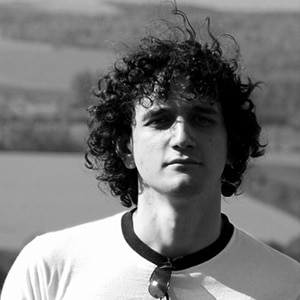
Georgi Petrov
PROS
Georgi Petrov
Georgi Petrov is a software engineer at PROS with more than 20 years of programming experience. He has a Master’s degree in Artificial Intelligence from Sofia University and at the roots of his day-to-day job lies his involvement with programming competitions in the distant previous century.
Applying Computer Science Algorithms in Air Travel Industry
We’ll have a look at some Air Travel Industry problems and how we approach them with Computer Science knowledge.
Audience requirements: Attendees are expected to be proficient in C++ and to bring their own development setup (e.g. laptop + IDE). C++ 11, STL (gcc) will be used for the exercise.

Dobromir Georgiev
PROS
Dobromir Georgiev
Dobromir Georgiev is a tech lead at PROS, developing software for airfare pricing and shopping. Having worked in both industry and academia, he has been creating software for over 8 years. His main interests are algorithm design, software architecture, and high-performance computing.
The travel search problem – from complex industry standards to pure algorithms and engineering
We will talk about combinatorial and search problems from real-life tasks within our product and we will propose possible computer science solutions with their pros and cons for one or more problems. We will cover up to 3 problems.
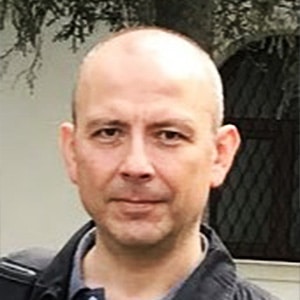
Dafo Nachkov
PROS
Dafo Nachkov
Dafo is Director Product Development at PROS. With over 20 years in the software engineering field, 7 of which in the travel industry, Dafo manages the processes of designing, building, delivering, and maintaining versatile software solution to complex business problems, with long-term strategy in mind. He is interested in service-oriented architectures, big data processing, application scalability and efficiency.
Applying Computer Science Algorithms in Air Travel Industry
We’ll have a look at some Air Travel Industry problems and how we approach them with Computer Science knowledge.
Audience requirements: Attendees are expected to be proficient in C++ and to bring their own development setup (e.g. laptop + IDE). C++ 11, STL (gcc) will be used for the exercise.
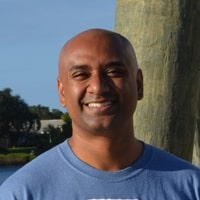
Reza Rahman
CapTech Ventures, Inc.
Reza Rahman
Reza Rahman is a long time consultant now working at CapTech. He has been an official Java technologist at Oracle. He is the author of the popular book EJB 3 in Action. Reza has long been a frequent speaker at Java User Groups and conferences worldwide including JavaOne and Devoxx. He has been the lead for the Java EE track at JavaOne as well as a JavaOne Rock Star Speaker award recipient. Reza is an avid contributor to industry journals like JavaLobby/DZone and TheServerSide. He has been a member of the Java EE, EJB and JMS expert groups over the years. Reza implemented the EJB container for the Resin open source Java EE application server. He helps lead the Philadelphia Java User Group.
Reza has over a decade of experience with technology leadership, enterprise architecture, application development and consulting. He has been working with Java EE technology since its inception, developing on almost every major application platform ranging from Tomcat to JBoss, GlassFish, WebSphere and WebLogic. Reza has developed enterprise systems for well-known companies like eBay, Motorola, Comcast, Nokia, Prudential, Guardian Life, USAA, Independence Blue Cross, Anthem, CapitalOne and AAA using Java EE and Spring.
MicroProfile state of the Union
Effective Docker and Kubernetes for Java EE Developers
Jakarta EE Expert Panel
Discuss the future of Jakarta EE with the main people behind it!
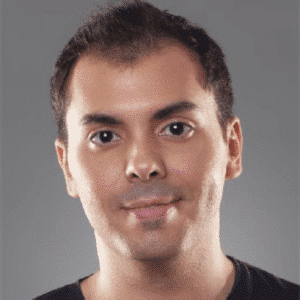
Ahmed Shabana
Parkpine Capital
Ahmed Shabana
Egyptian American entrepreneur-turned investor Ahmed Shabana is the current managing partner of the $150 million fund one Parkpine Capital, the U.S.-based venture capital firm he formed with partner Billy Zane most known in Hollywood for the movies Titanic and The Phantom. Launched in 2016, Parkpine has offices in Los Angeles and Menlo Park.
Ahmed is recognized as a high impact entrepreneur by the Wall Street Journal and The Financial Times by founding the Middle East’s first & Africa’s first eCommerce portal and online pharmacy, Agzakhana.com, generating millions in sales turnover while overcoming the economic and commercialization obstacles of the region. Moreover, Ahmed was able to raise capital from Vodafone Ventures and help fundraise for a number of Healthcare, BigData, and SaaS startups of over $800M in combined valuation.
Ahmed holds an MBA from the the University of Southern California, where he was inspired to form Parkpine as a way to improve access to funding and resources for tech entrepreneurs on a global scale. He funded the Global Ventures Summit to connect influencers of the highest growth startup ecosystems in the world. The Summit enables innovative startups to access venture capital professionals, funded technology startup founders, and policy makers in the freshest tech scenes on the planet.
Parkpine’s fund will target post-revenue investments in early-stage technology ventures in growing markets around the world. The fund has a broad mandate invests in tech companies with business models that can be replicated in different markets.

Delyan Lilov
Musala Soft JSC
Delyan Lilov
Delyan Lilov is founder and CEO of Musala Soft JSC, leading software services company specialized in some of the most challenging industries worldwide like Cloud Integration, API Management, Augmented Intelligence, BigData, Digital Engagement and IoT.
As a CEO of Musala Soft for more than 18 years, Delyan Lilov is responsible for defining the corporate strategy, managing operations and participating in key clients` management. His experience, professionalism and business views lead Musala Soft as a reliable, prestigious and long-term partner for innovative and trendsetting enterprises such as: IBM, Tsystems, VMWare, Experian, SAP, Atos, Cellent, Milestone, UGT, Deutsche Telekom, Telenor, A1, Vivacom, OTP Group, KBC, DZI, Commerzbank, Generali, Bulgarian Guarantee Fund, Visa, Telus Health, Telus International, ESG, Phillip Morris, Edoardo Miroglio, etc.
Committed to lifelong learning, knowledge sharing and a high degree of personal involvement, Musala Soft successfully develops its people and enlarges its offices in Macedonia and Bulgaria. The company is a proud winner of multiple national and international honors and recognitions in Talent Development, Science and Innovation, Quality of Software Solutions, Leadership and Corporate Social Responsibility.

Mark Stephen Meadows
Botanic Technologies, Inc
Mark Stephen Meadows
Meadows is an American author, inventor, artist and entrepreneur. With 18 years in AI, 22 in VR, and 7 years in blockchain he has designed and developed AI applications at some of the world’s top research labs (Xerox-PARC, SRI, Waag, and others). He has worked as a government-level consultant in both hemispheres, is the author of a half-dozen patents, and has written four books that examine technology and their social consequences. As founder / CEO of Botanic.io and co-founder / Trustee of SeedToken.io, he leads the vision of the companies by inventing new methods of computer-human interaction, designing the hearts and minds of highly social software robots.
Ethical AI and Blockchain: A Democratic approach
This presentation looks at conversational user interfaces (CUIs), how they will be coupled with blockchain and AI, and their impact on our near future. Popular CUIs are Alexa and Siri. As these systems collect more user data, which is used to train AI systems, we need to consider several key issues, including: trust – who is responsible for these bots; privacy – who has access to my data; and ethics – what is my data being used for? We look at solutions, why blockchain is needed to solve problems AI introduces, and ways to provide maximum value to all stakeholders.

Luis Weir
Capgemini
Luis Weir
Father, Author, Blogger, Speaker, Oracle Developer Champion and Ace Director, Luis Weir is a Chief Architect and API/Microservices evangelist in Capgemini. He is Very passionate about modern technologies, Luis has over 15 years of experience implementing complex systems in many parts of the world.
Co-author of 3 books and author of Enterprise API Management, as well as many articles and white papers, Luis is a frequent speaker at events such as JavaOne and Code events -most recently in London, Beijing, Sydney and SFO. Luis holds an MS in Systems Integrations from Universitat Politecnica de Valencia and a BS in Electronics Engineering from UNE.
GraphQL as an alternative approach to REST
Originally designed by Facebook to allow its mobile clients to define exactly what data should be send back by an API and therefore avoid unnecessary roundtrips and data usage, GraphQL is a JSON based query language for Web APIs. Since it was open sourced by Facebook in 2015, it has undergone very rapid adoption and many companies have already switch to the GraphQL way of building APIs – see http://graphql.org/users.
However, with some many hundreds of thousands of REST APIs publicly available today (and many thousands others available internally), what are the implications of moving to GraphQL? Is it really worth the effort of replacing REST APIs specially if they’re successful and performing well in production? What are the pros/cons of using GraphQL? What tools / languages can be used for GraphQL? What about API Gateways? What about API design?
With a combination of rich content and hands-on demonstrations, attend this session for a point of view on how address these and many other questions, and most importantly get a better understanding and when/where/why/if GraphQL applies for your organisation or specific use case.
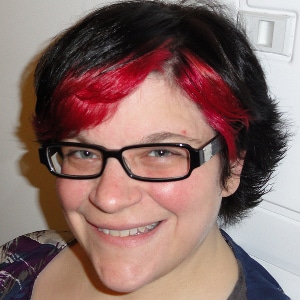
Mandi Walls
Chef Software
Mandi Walls
Mandi Walls is Technical Community Manager, EMEA at Chef. For Chef, she helps technology organizations increase their effectiveness using configuration management and modern IT practices. She is a regular speaker at technical conferences, and is the author of the whitepaper “Building a DevOps Culture” published by O’Reilly. She is interested in the emergence of new tools and workflows to make the task of operating large complex computing systems more approachable.
Modern Application Automation with Habitat
Habitat is an open source project from Chef Software designed to help you encapsulate exactly what your application needs to run in a single artifact. Build once for Linux, run on any Linux distribution without having to worry about the diverse naming conventions or versions for your dependencies. Build for Windows and deploy as a standalone service. Bring legacy applications forward onto new platforms or into the cloud even if you don’t have access to all of the source code. This talk will focus on the key features of Habitat, including demos of how to build and run an application in the Habitat environment.
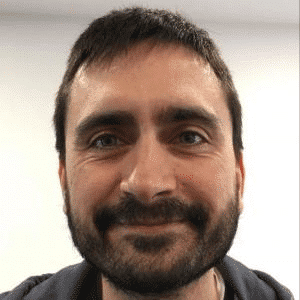
Dan Lebrero
Akvo
Dan Lebrero
Daniel Lebrero is a technical architect with more than 15 years of software development experience. He has worked on monolithic websites, embedded applications, low latency systems, micro services, streaming applications and big data. He now creates open source software at Akvo. A long time Java practitioner, he now also loves ().
Java with a Clojure mindset
New languages bring new ways of thinking and teach us new principles and tools that we can bring back to your day to day language.
Using a real application as an example, we will learn how to build and design Java applications that follow Clojure’s functional principles using just core Java, without any libraries, lambdas, streams or weird syntax; and we will see what benefits those functional principles can bring.
No Clojure or functional programming knowledge required, just plain old good Java.

Steve Kosten
Cypress Defense
Steve Kosten
Steve Kosten is a security consultant at Cypress Data Defense and an instructor for the SANS DEV541 Secure Coding in Java/JEE: Developing Defensible Applications course. He’s previously performed security work in the defense and financial sectors and headed up the security department for a financial services firm. He is currently the Open Web Application Security Project (OWASP) Denver chapter leader and is on the board for the OWASP AppSec USA conference. He has presented security talks before numerous conferences. He is experienced in secure code review, vulnerability assessment, penetration testing, risk management. He holds a bachelor of science in Aerospace Engineering from the Pennsylvania State University and a Master of Science in Information Security from James Madison University. He currently maintains GSSP-JAVA, GWAPT, CISSP, and CISM certifications. Steve resides in Golden, Colorado. In his spare time, Steve enjoys attending his childrens’ sporting events with his wife, road and mountain biking, snowboarding, golfing, volleyball, and flying.
Why You Need a Secure SDLC and How to do it
The security team is not just those security professionals who yell at us to not click on links, we are part of the security team. In this talk, we will discuss and demonstrate why security is important by demonstrating some exploits and then talk about how we can integrate some security into our SDLC.

Michael Schrenk
Self
Michael Schrenk
Michael Schrenk has developed software that collects and processes massive amounts of data for some of the biggest news agencies in Europe and leads a competitive intelligence consultancy in Las Vegas. He consults on information security and Big Data everywhere from Moscow to Silicon Valley, and most places in between. Mike is the author of Webbots, Spiders, and Screen Scrapers. He has lectured at journalism conferences in Belgium and the Netherlands and has created several weekend data workshops for the Centre for Investigative Journalism in London. Along the way, he’s been interviewed by BBC, the Christian Science Monitor, National Public Radio, and many others. Mike is also an eight-time speaker at the notorious DEF CON hacking conference. He may be best known for building software that over a period of a few months autonomously purchased over $13 million dollars worth of cars by adapting to real-time market conditions.
Malware Included
There’s no doubt that today’s developers benefit from imported third-party libraries. Easy to import applications like Google Charts and frameworks like jQuery facilitate quicker software development cycles and more professional results. But while the use of imported third-party libraries is on the rise, there is little awareness that unvalidated, and uncontrolled, third-party include files could also be used as attack vectors for delivering malware. To better understand the potential scope of this problem, this talk shares the results of a survey conducted to gauge the prevalence of websites that import uncontrolled, unvalidated, third-party software. We’ll then look at how these include files could be used to deliver malware, compromise privacy, or deliver ransomware. Finally, we’ll explore ways to mitigate the dangers of importing third-party software libraries.
How Metadata Makes Big Data Bigger
When most people here the word “metadata” they instinctively think of embedded fragments of information that help describe digital photographs or office documents. But in other people’s hands, metadata provides the context where data exists. And that context can be converted into powerful intelligence that expands and enhances available information. When properly applied, metadata can be used to fill-in the gaps between data to reveal a picture that couldn’t be painted by the original data alone. In this talk, you’ll learn how metadata is created from existing data to solve business problems. The speaker will also share techniques he has used to answer questions about the viability of one of his own businesses. Additionally, you will also learn techniques to keep your organization from leaking information through metadata creation.
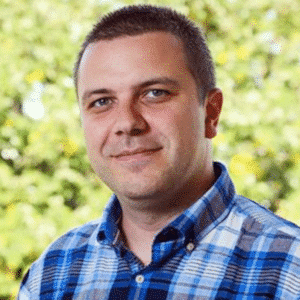
Angel Gruev
Dreamix
Angel Gruev
Angel Gruev is a co-founder and CTO of Dreamix Ltd. He has more than 12 years of experience in Software Architecture, Project Managеment, Research and Development. Angel has a Bachelor in Computer Science from Sofia University and Masters in Technological Enterpreneurship and innovations in Informational techologies. He is a professor in Sofia University teaching Computer Science and regularly gives lectures about Java in different companies. Angel has a great success record being a Software Architect for major international companies.
Zero downtime deployments with Kubernetes, Docker and Spring-boot
While building and deploying microservices (and not only) it is important to know the underlying framework that will be their host. This presentation will be focused on Kubernetes as a container orchestration framework and will target software developers that want to understand better how it works and what features does it provide for your microservices. The main focus will be on creating and deploying a microservice on Kubernetes and then performing a zero-downtime release and rollback.
The demo microservices use JAVA + Spring boot.
The presentation will cover:
- Different ways of using K8S (Amazon, Google, On premise)
- Deploy a simple demo microservice build with Java and Spring boot.
- Using K8S Config Maps for storing configuration of your microservices.
- Achieving Zero downtime deployments with Kubernetes rolling updates feature.
- Taking care for the High Availability of your microservices
- Kubernetes and continuous integration
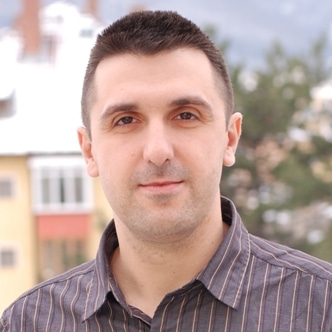
Martin Kulov
Association of Software Engineers
Martin Kulov
Martin Kulov has 20 years professional experience in the software industry. During the years he has held various positions in the professional software engineering field. Martin helps building high quality software systems and teams. He loves to make software work better and faster, and to solve critical problems in production environments.
He is long time speaker at events related to Microsoft technology in Bulgaria and abroad. He has been awarded as Microsoft Most Valuable Professional (MVP) for 12+ years.
Last but not least – Martin is president of Association of Software Engineers, non-profit organization that thrives to help software engineers in their lifelong learning activities and professional development.
10x Developer
Rockstar, ninja, guru – you heard it all. There are certain qualities that 10x developers have so we will examine some of them. Join the discussion on what’s common between high performing organizations, transformational leadership and why software engineers play vital role in all this. And yes – 10x developers do exist! Want to take the challenge to prove me wrong?
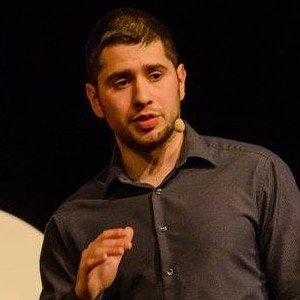
Preslav Mihaylov
Academy
Preslav Mihaylov
Preslav is a Blockchain Developer and Technical Trainer at Academy, School of Blockchain.
Throughout his career, he has led programming courses for both novices and experienced professionals with topics ranging from Introduction to Programming to Data Structures and Algorithms.
He is also a speaker at numerous events and schools in Bulgaria.
You can find out more about him on his personal website – http://pmihaylov.com.
Learn Blockchain By Building It
Blockchain is the new buzzword in our industry. And not only there.
It expands its reach to many areas of our life and has the potential to revolutionize the way we deliver and use goods and services.
That is why, we ought to catch up by learning what it actually is.
And what better way to learn it than by actually building one live?
On Java2Days, I will walk you through how Blockchain works by building our own version of it in Python.
We will address concepts such as nodes, mining, proof of work, addresses and much more.
So save the date and see you there!
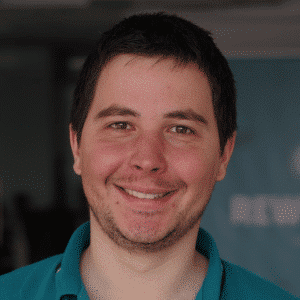
Nikola Bogdanov
REWE Digital
Nikola Bogdanov
Nikola Bogdanov is an Agile enthusiast with deep interests in people, team and organizational facilitation and coaching. He works as an Agile Coach in REWE Digital GmbH, which is a part of the REWE Group.
Nikola has worked as an Agile Coach, Scrum Master and Agile Leader in the last several years. He has more than 10 years of experience in IT industry, taking part in big and small companies, having many different roles from Software Engineer to Organizational Agile Coach.
You can often see him presenting different aspects of Agile and Lean approaches at conferences, trainings and public lectures. He transforms his appetite for Agile into lifestyle. He is also a university teacher, lecturing Agile and Lean in the past 4 years at the University of Sofia, where he is working on his PhD focused on Agile.
Nikola combines strong technical background, an academic knowledge and rich expertise. He shares his knowledge and experience through helping, coaching and lecturing modern methodologies, implementing and examining Agile and Lean in dynamic environments.
Domain-driven design, CQRS and Event sourcing
Self-organizing scrum teams are just not enough! As per the Agile Manifesto “The best architectures, requirements, and designs emerge from self-organizing teams.”, which is true. According the Conway’s law it is also true the opposite, every great team and working smooth is not possible without great architecture.
Microservices and practices like DDD, Event sourcing and CQRS are the answer of enabling the Agility. In REWE Digital we have learned a lot from these practices and we want to share the lessons learned, showing also some real examples, of course everything is Java based. The whole stack is super impressive, we use Spring boot, Apache Kafka and many more.
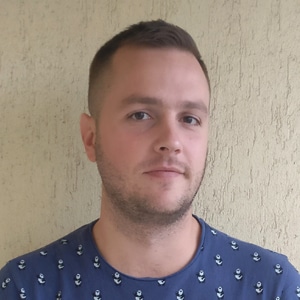
Veselin Hristov
ITGix
Veselin Hristov
Veselin Hristov is Cloud and Middleware engineer at ITGix Ltd. Has 5+ years of experience in Linux administration working by DevOps mothodology. Veselin has a Master degree in Electronics from Technical University – Sofia. He has been working with many development teams across the world to deliver a stable infrastructure environment for his client’s software services.
Zero downtime deployments with Kubernetes, Docker and Spring-boot
While building and deploying microservices (and not only) it is important to know the underlying framework that will be their host. This presentation will be focused on Kubernetes as a container orchestration framework and will target software developers that want to understand better how it works and what features does it provide for your microservices. The main focus will be on creating and deploying a microservice on Kubernetes and then performing a zero-downtime release and rollback.
The demo microservices use JAVA + Spring boot.
The presentation will cover:
- Different ways of using K8S (Amazon, Google, On premise)
- Deploy a simple demo microservice build with Java and Spring boot.
- Using K8S Config Maps for storing configuration of your microservices.
- Achieving Zero downtime deployments with Kubernetes rolling updates feature.
- Taking care for the High Availability of your microservices
- Kubernetes and continuous integration
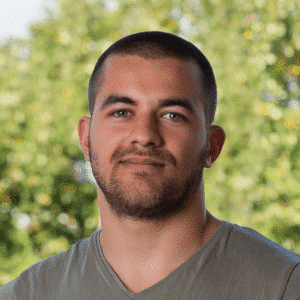
Denis Danov
Dreamix
Denis Danov
Denis Danov is full-stack developer and dev lead at Dreamix Ltd. He has 5+ years of experience in software engineering, research and development. Denis has a Bachelor degree in Software Engineering from Sofia University and Masters degree in Embedded Systems. He has worked with many teams located all around the world to deliver successful products for international companies.
Zero downtime deployments with Kubernetes, Docker and Spring-boot
While building and deploying microservices (and not only) it is important to know the underlying framework that will be their host. This presentation will be focused on Kubernetes as a container orchestration framework and will target software developers that want to understand better how it works and what features does it provide for your microservices. The main focus will be on creating and deploying a microservice on Kubernetes and then performing a zero-downtime release and rollback.
The demo microservices use JAVA + Spring boot.
The presentation will cover:
- Different ways of using K8S (Amazon, Google, On premise)
- Deploy a simple demo microservice build with Java and Spring boot.
- Using K8S Config Maps for storing configuration of your microservices.
- Achieving Zero downtime deployments with Kubernetes rolling updates feature.
- Taking care for the High Availability of your microservices
- Kubernetes and continuous integration

Nikolay Angelov
SoftUni
Nikolay Angelov
Nikolay Angelov got into coding in early 2007 when he wrote his first mIRC script. He realized his love for coding and jumped into Web Programming. He continued to work in the field for 8 years and gained experience with various languages, for example, PHP, JavaScript, and MySQL. He then took a short break from programming to work on personal projects. A year ago, Nikolay re-discovered his passion for programming while taking a course about Blockchain. He is now a Blockchain Trainer and a Blockchain Developer. His passions are everything Blockchain, Solidity, C++, Vim and Blogging. Nikolay has a Personal Blog where you can read about topics that interest him: http://nikolaytech.com
Blockchain Disasters
In this talk we will cover all disasters that happened in the Blockchain world. Some of the attacks on the different networks and all the money stolen from different exchanges/websites/Smart Contracts.
Scaling the Blockchain: Lightning Network
Blockchain is having few problems and scaling is one of them. Currently the transaction throughput of Bitcoin is only 7 transactions per second and this is quite low. One of the current off-chain solutions or so called Layer 2 is the Lightning Network. In this talk we will see why we need the Lightning network and understand how it works with a simple story.

Euan Finlay
Financial Times
Euan Finlay
Euan leads a team at the Financial Times, supporting Java & Go microservices, Docker containers in Kubernetes, and the website as a whole.
On the Ops-ier side of DevOps, he has occasionally admitted to being a sysadmin in public.
Don’t Panic! How to Cope Now You’re Responsible for Production
More and more developers are expected to be on-call, provide out-of-hours support, and respond to production outages. If you don’t have much experience handling incidents, it can be scary, intimidating, and feel like being dropped in the deep end. But it doesn’t have to be that way!
Over the last few years on the FT’s Content team, we’ve transformed our incident response – from a number of mildly terrifying multi-hour outages, to a stable platform where team members feel comfortable on-call.
This talk will provide practical tips and advice on:
- setting up an incident response framework
- what to do when Everything Is On Fire™
- improving things afterwards
- and some horror stories of our own…
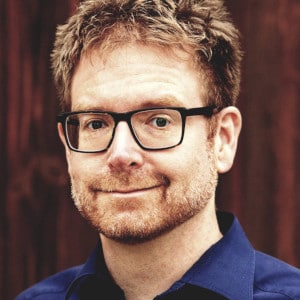
Christian Heger
Zuhlke Engineering
Christian Heger
Christian Heger is a team lead at Zuhlke Engineering. He has made lots of interesting mistakes with .NET and architecture.
Gearing architecture for agility
Successful agile software development needs more than SCRUM meetings. The architecture of a system, and the way how we think and talk about it, are make-or-break factors. This talk gives a fast-paced, high level and opinionated view on gearing architecture to support agility.

Mihail Stoynov
BG JUG
Mihail Stoynov
The Bulgarian Java User group was founded in September 2007 along with a mailing list for discussion of any Java-related questions, problems and upcoming technologies. After a short period of dormancy, five members set leadership board in 2013. It triggered regular meetups and sessions once or twice a month with local and foreign speakers. The JUG first took part in several Adopt OpenJDK activities and soon after that became JCP member. The events and workshops organized by the community are sponsored and backed up by IT companies on the Bulgarian market
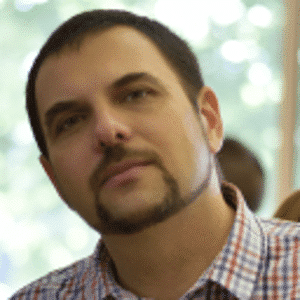
Petar Velikov
AUG Sofia
Petar Velikov
Atlassian Users Group Sofia functions since 2015. It is established thanks to the active support from Atlassian which have realized the importance of supporting the user communities for their products around the world.
On our events we strive to create environment where people can share experience and ideas mostly about Atlassian products but any other topics related to IT industry in general are welcome.
The groups grows and new people are constantly joining. Currently we have about 200 members. The group has 3 leaders which share the tasks for organizing the group. On our events usually gather more than 20 people.
Petar Velikov is one of the people which help with the organization and the life of the group. He has many years experience not only with Atlassian products but also with the software development as whole.
AUG Sofia – Lets Share Experience and Ideas
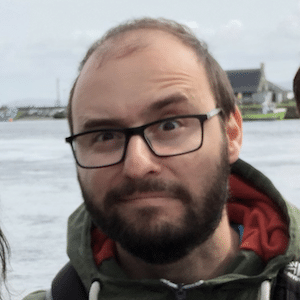
Alexander Vakrilov
Angular Sofia Meetup
Alexander Vakrilov
Alex has been a developer for more than 10 year. Most of that time in Telerik (now Progress) working on products and tools for developers.
Currently, he is working on NativeScript and is excited about open source. Hе also co-organizes the Angular Sofia meetup, because he believes that if you have spend a whole day of writing dirty hacks – you better spend the evening talking about pure functions with some cool folks.
Come here to learn a bit more about the Angular community in Sofia
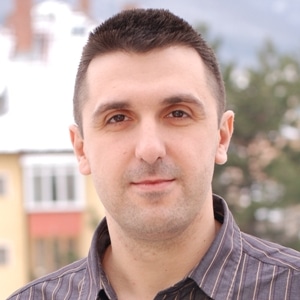
Martin Kulov
Association of Software Engineers
Martin Kulov
Association of Software Engineers (ase.bg) is a non profit organization that helps professional software engineers with their lifelong learning challenges and achieve software engineering excellence.
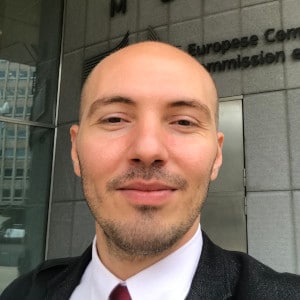
Galin Zhelyazkov
Beehive co-working space Varna
Galin Zhelyazkov
Galin Zhelyazkov is a IT serial entrepreneur. Graduated software engineering and management, global innovation management and entrepreneurship and innovation in Sweden, UK and Australia. Co-founder and founder of a total of 5 companies from different fields.
He worked on numerous projects in his hometown of Varna as drive moving theatre, summer cinema in Varna, co-working space Varna beehive.bg, Startup Weekend Varna, Startup Europe Week, Startup Grind and TEDxPlovdiv (in Plovdiv). He is also a mentor to several young entrepreneurs.
The Startup Ecosystem of Varna 2013-2020

Veselina Mihaylovska
Cat and Mouse Coworking
Veselina Mihaylovska
Cat and Mouse Coworking was formed as a natural extension of the first craft beer bar in Kapana. It is the place for all those creative people who need a slightly more relaxed atmosphere but without going beyond the boundaries of the creative district, where inspiration is literally everywhere. The new concept follows the idea of creating a different social environment and additional climate change in the creative district.
Cat and Mouse Experience

Didi Milikina
Coding Girls
Didi Milikina
Coding Girls is a gender-neutral organization promoting an increased presence of girls and women in the tech, leadership and entrepreneurship. We inspire and empower girls to get in technology and develop a tech-career. Coding Girls delivers a series of worldwide events, workshops and courses. With 1000+ members across the world, we are continuously growing and increasing the number of girls and women in tech.
Coding Girls: Empowering Girls and Women in Tech
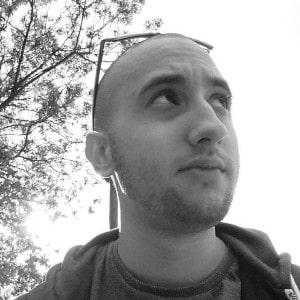
Dimitar Dzhurenov
EOS Sofia
Dimitar Dzhurenov
Dimitar Dzhurenov is CEO/Founder at Infinite X Labs – blockchain development & consultancy company based in Sofia. He is also the founder of EOS Bulgaria and one of the most active advocates of EOS in the Bulgarian community.
EOS & The Smart Contract Revolution – Why should we pay attention?
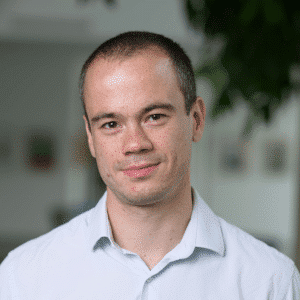
Boris Strandjev
GDG Sofia
Boris Strandjev
GDG Sofia is а group of enthusiasts that gather around Google technologies. We organize different events – seminars, conferences or just dine outs, and discuss the latests developments.
GDG Sofia – Google’s innovations in your city
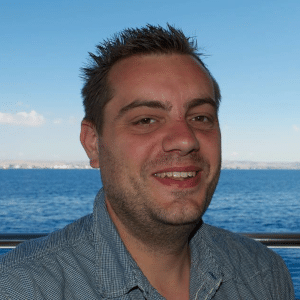
Arjan van Eersel
Rust Bulgaria / Go Bulgaria
Arjan van Eersel
Arjan comes from the world of corporate services and has been a consultant for international business and taxation for many years, while also coding on internal and open source software projects. Now with his business domain knowledge and coding experience his company is working on delivering software, which uses modern technologies such as blockchain and self-sovereign identity, for the corporate services sector. He also (co)-hosts the Bulgarian meetups for Go, Rust, Hyperledger and aeternity blockchain.
Building an open source community for Go
An introduction to Rust

Vyara Savova
Sofia Legal Hackers
Vyara Savova
Legal Hackers is a global movement of lawyers, policymakers, designers, technologists, and academics who explore and develop creative solutions to some of the most pressing issues at the intersection of law and technology. Through local meetups, hackathons, and workshops, Legal Hackers spot issues and opportunities where technology can improve and inform the practice of law and where law, legal practice, and policy can adapt to rapidly changing technology.
Sofia Legal Hackers – the legal industry is no longer solely about law & lawyers

Boris Angelov
The Hub AUBG
Boris Angelov
Boris is a senior student majoring in Business Administration and Computer Science from the American University in Bulgaria, currently President of the student technology club – The Hub AUBG. Being exposed to the Liberal Arts system allowed him to broaden his knowledge in fields of IT and business. By immersing himself in challenging environments, he strives to sustain his passion and enthusiasm for never-ending learning while contributing to society.
The path to finding inspiration

George Petrov
Trevor Workspaces
George Petrov
Trevor Workspaces is aiming to build a network of on-demand workspaces, that attract talent and provide “Maker space” infrastructure for hardware builders.
The Role of Coworking Spaces in a Shared Economy
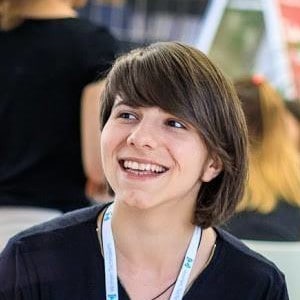
Sofia Lyateva
Women Techmakers Sofia
Sofia Lyateva
Google’s Women Techmakers program provides visibility, community, and resources for women in technology. From 2014 to present, Women Techmakers is continually launching global scalable initiatives and piloting new programs to support and empower women in the industry.
WTM is inclusive and welcomes all the people interested in changing mindsets and unbiasing with education, passion and support!
WTM Sofia – A Catalyst for Opportunities
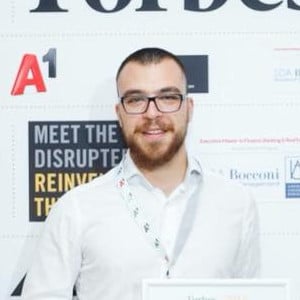
Bozhidar Georgiev
Work&Share Coworking Space
Bozhidar Georgiev
CEO at Work & Share – one of the biggest coworking spaces in the Balkan region – 300 + Members in the community / 3000+ sqr.meters
Why coworking is the future of work?
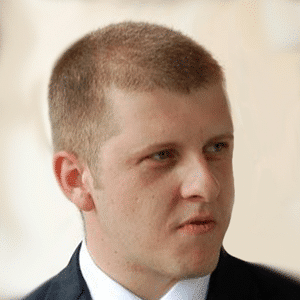
Dimitar Bosovski
Balkan Center
Dimitar Bosovski
Dimitar is 30 years old hard worker with two kids at home. In the past 10 years he takes part as owner or Product Manager or products involving hardware & software development- Mobile payments, IoT, Home Automation, Industrial solutions and even house and office constructions. Dimitar is part of projects like Findy, HiGPS, S2our, Balkan Center, Passive Smart House and many others.
Addressing psychological risks at work
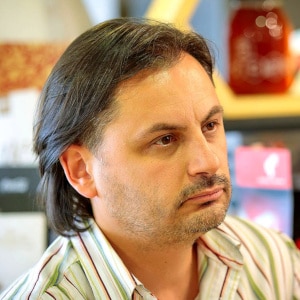
Neven Boyanov
Programmers’ Club in Veliko Tarnovo
Neven Boyanov
Irrepressible startup enthusiast, entrepreneur, lecturer, activist at the Programmer’s Club in Veliko Tarnovo. Started in 2013 the Tinusaur Project – an educational platform for learning electronics, robotics and programming. Co-founded in 2007 Interlecta, a product company with offices in Bulgaria and in US that develops products in the field of telemedicine.
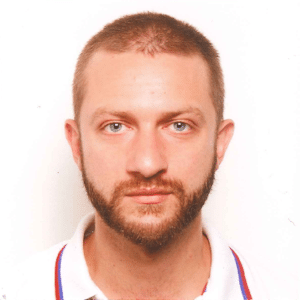
Stefan Kiryazov
Church of the Flying Spaghetti Monster
Stefan Kiryazov
Stefan, like most geeks, rejected the faith of his parents early in his childhood. Later in life, however, he missed the community support and sense of purpose that religious people enjoy – until he found Pastafarianism.
He converted to his new faith in 2009 and has spearheaded the Bulgarian branch of the church ever since. In 2016 Stefan and his now wife became the first couple in Bulgaria (and only 2nd in the world) to have a Pastafarian wedding ceremony, a rite they now recommend for everyone who finds the traditional church wedding boring and misogynistic.
The Flying Spaghetti Monster – The overlord of technology and beer

Scott Meyers
Special Guest
Scott Meyers
Scott Meyers is one of the most influential names in C++. His books (e.g., Effective C++ and Effective Modern C++) are essential C++ reading, but his influence extends into other programming communities. His writings and lecturing have made him one of the most respected names in software development
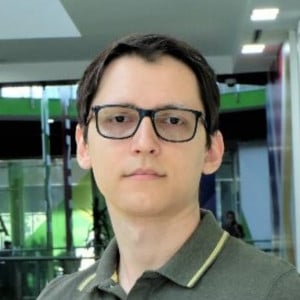
Viktor Tsvetkov
Telerik Academy
Viktor Tsvetkov
Viktor Tsvetkov has over 10 years of experience as a Software Developer and Technical Team Lead. He is a seasoned expert in desktop, mobile and web development. At Telerik Academy, he is responsible for the creation and integration of key software solutions that power the leading tech-ed organization’s innovations and development. Prior to joining Telerik Academy, Viktor was part of Telerik and then Progress product teams. He has a bachelor’s degree in “Informatics” from Sofia University “St. Kliment Ohridski”.
Authentication and Authorization in .NET with OpenID Connect
- The security stack for modern applications
- Using OAuth2 for Authorization – different OAuth2 flows
- Using OpenID Connect for Authentication
- What are JSON Web Tokens (JWT)
- Using IdentityServer 4 as a token service for .NET applications

Andrew Lombardi
Mystic Coders
Andrew Lombardi
Andrew Lombardi is one of a new breed of businessmen: the enlightened entrepreneur. He has been writing code since he was a 5-year old, sitting at his dad’s knee at their Apple II computer. Having such a deep affinity for the computer model, it is no surprise that at the age of 17 he began to delve deeply into the inner workings of the human mind. He became a student of Neuro Linguistic Programming and other mind technologies, and then went on to study metaphysics. He is certified as an NLP Trainer, Master Hypnotherapist and Time Line Therapy practitioner.
Using all of his accumulated skills, at the age of 24, Andrew began his consulting business, Mystic Coders, LLC. Since the inception of Mystic in 2000, Andrew has been building the business and studying finance and economics as he stays on the cutting edge of computer technology.
Achieving a clear mind by controlling social media
With the advent of the always-on network and smartphone constantly by our sides it has become much more difficult to achieve a clear mind. Stop letting social media and the always-on network rob you of precious moments of a clear head. Learn how to extract joy from the real moments that exist online and not become a slave to the fantasy world of social media.
Serverless deployment with AWS
Gone are the days that required a developer to work with IT to provision a physical machine and add it to a rack. Learn how to write code that runs without a defined machine and only on demand. In this talk we’ll introduce many of the products provided by Amazon and deploy an API using Python to AWS Lambda without an EC2 machine or ECS instance.

Svetlin Nakov
SoftUni
Svetlin Nakov
Svetlin Nakov (http://nakov.com) is a passionate blockchain engineer, technical trainer and experienced developer in broad range of technologies. He is a technical advisor in several successful blockchain ICO projects. Svetlin has 20+ years of technical background as software engineer, software project manager, consultant, trainer, and entrepreneur. He is author of 13 books on computer programming and software technologies and tens of technical and scientific publications. Svetlin has been a speaker at hundreds of conferences, seminars, courses and other trainings. He holds a PhD degree in computer science, medals from the International Informatics Olympiads (IOI) and the Bulgarian President’s award “John Atanasoff”. Currently Svetlin drives the largest training center for software engineers in Bulgaria – the Software University, where he teaches thousands of young people in software development.
From Traditional Cloud to Decentralized Cloud
In this talk the speaker will discuss the technological transition from traditional cloud to the upcoming decentralized cloud, how data, computational processes, storage, databases, messaging, payments, site hosting and other cloud services find their way to decentralization and how peer-to-peer networks and blockchain systems evolve into a decentralized cloud.
Topics to be discussed:
- Traditional computing vs. cloud vs. decentralized cloud
- Decentralized apps, platforms and organizations
- Decentralized processes, data, and governance
- The future of miners as service providers in the decentralized cloud
- What we have today in the decentralized cloud?
Featured Talks From 2017
Gaining persistence by abusing advanced authentication mechanisms
In this talk, we briefly mention some of the past techniques for gaining persistence, followed by an analysis of non-mainstream methods and focusing on leveraging Active Directory features to achieve persistence.
Identity theft: Developers are key
Identity theft is perhaps the most concerning kind of Cybercrime nowadays. It is not only about how secure is your program, but how aware are you? Or better said how naive are we in practice as developers in this big bad world.
Attacking .NET Serialization
In this talk, we will analyze .NET serializers for potential RCE vectors. We will demonstrate that RCE is also possible in .NET and present details about the vulnerable serializers and discuss common configurations that make other libraries vulnerable.
Automating Incident Response for AWS Compromises
Incident Response procedures differ in the cloud versus when performed in traditional, on-premise, environments. The cloud offers the ability to respond programmatically but what about a pwnd API key?
Into Ethereum
This talk will cover the inner workings of Ethereum and compare it with its more famous crypto cousin Bitcoin. How Ethereum works, how is that different than Bitcoin, Solidity, Smart Contracts in Ethereum and Bitcoin Script.
Secure Session Management
How do we build and maintain secure sessions? What to keep in mind while designing our systems? Which industry standards to apply for a more secure environment? What common mistakes to avoid?
CodeMonsters Highlights
A Unique Experience for Software Professionals
The first-of-its-kind and first-of-its-scale event for software engineers in Europe, which is focused not only on development technologies but is dedicated to improving every aspect of developers’ life.
Development Technologies & Latest Trends
Get ready to take in three days of the most popular and cutting edge development technologies combined with practical training, tips and tricks from the leading industry experts.
inspirational Speakers & Coding Tips
See our inspirational speakers dedicated to helping you reach the next level of coding and career development. Choose from more than 50 in-depth sessions, hands-on labs and discussions.
Engineering Culture & Soft Skills for Devs
Learn why a company’s engineering culture is possibly the most important thing an engineer can consider when evaluating a job offer and which are the most useful soft skills for software developers among other things.
Lifestyle & Free Time Activities
Get the chance to see new motorcycles and attend riding school, take cooking classes or try any other activity you would not expect to experience during a software development conference.
Community Friendly with Free Tracks
CodeMonsters is a commercial event, but we do support the community in any possible way. The conference offer free of charge tracks accessible through registration.
Subscribe to our newsletter to get latest updates
CodeMonsters Tracks
Core Languages
C/C++, JavaScript, Python, .NET/Mono, PHP, Ruby and Others
Emerging Languages
Go, Rust, Swift, Node.js
Modern Web
JavaScript frameworks & tools, CSS3, HTML5
Mobile Development
iOS, Android, Cross-platform frameworks
Databases
SQL, NoSQL, Distribution, Replication, Performance
Backend & HPC
Services frameworks and tools, Scaling, Performance Tuning, Algorithms
Big Data & Analytics
Data Storage, Processing, Analysis, Decision Making
QA Engineering
Continuous Integration, Automation, Verification
Cloud, DevOps & Infrastructure
The Operations perspective on Software Development
Development process, Methodologies, Tools
The healthy environment needed for every IT Professional
Security & Risk Management
Designing robust applications resilient to contemporary attacks
IoT and Robotics
RPi, Arduino, Embedded
Reserve your seat now
What's new @ CodeMonsters
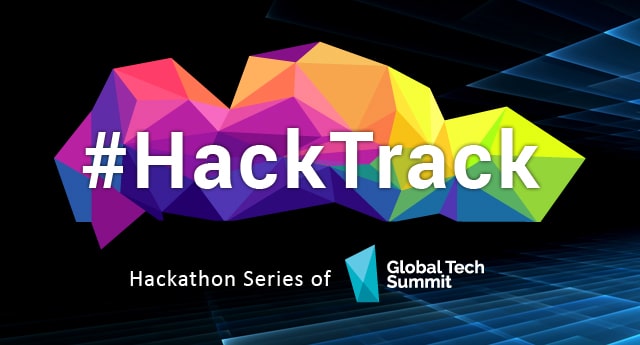
HackTrack
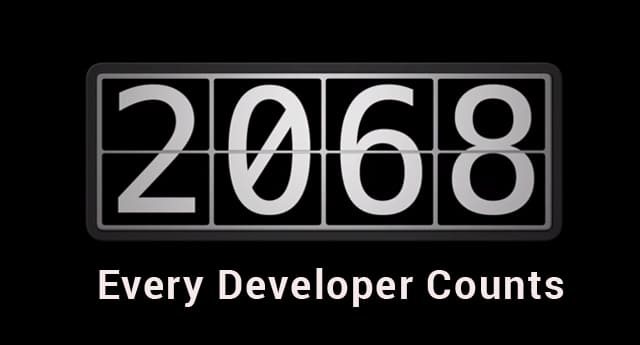
Be Ready!

#WomenReality

Discussions

RE:Charge
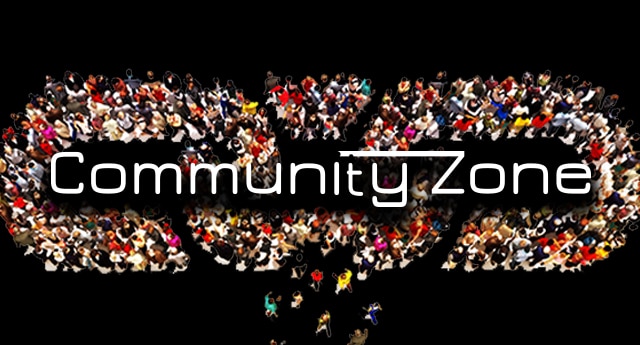
Join the Community!
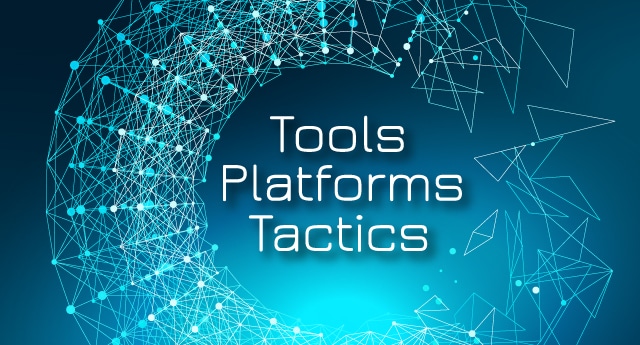
Tools&Platforms

#JobsAhead
Who attends?

Why sponsor
Developers Gathering Point
2500+ Leads
Great Atmosphere
Special Awards
Full Halls
Hackathons
Highlights
60+ Speakers
5 Stages
80+ Sessions
1500+ Connections
Discussions
Networking
Still not convinced? See the most important reasons to attend.
See the full list of all attendee titles
Check pricing and packages
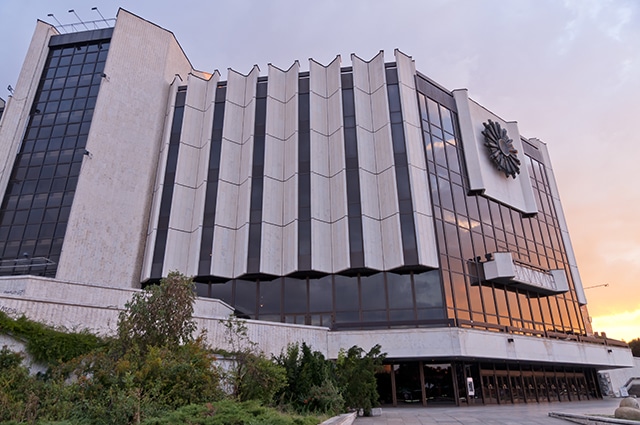

Venue: NDK - Congress Center
20 000+ sq.m.
4 000+ Seats
Prestigious
Great location
Check out the conference venue
Latest news
By:momchil Comments:0
The sponsors of Women Reality have been announced
Special thanks to the sponsors of our initiative WR: Bosch Software Innovations, Epay.bg,VMware, Devolo,SBTech, Lidl Digital, Tumba Solutions…
By:momchil Comments:0
The 2nd wave of CodeMonsters 2018 sponsors is already announced!
The 2nd wave of CodeMonsters 2018 sponsors is already announced! Special thanks to our valued…
By:iva Comments:0
Check out the new speakers announced!
CodeMonsters has announced more speakers. The growing list of speakers includes: Angel Gruev, Dreamix Preslav…
